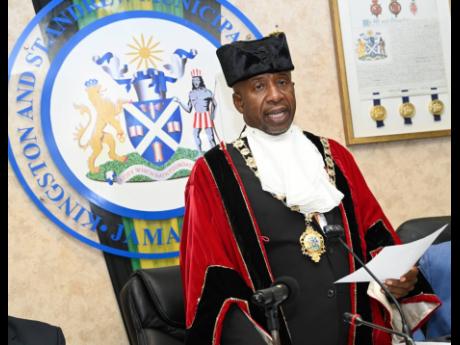Editorial | Watching parish councils
By the end of October, a little less than two and a half months from now, Jamaica’s local government authorities are, by law, to submit to the national minister their budgets for the next fiscal year, beginning April 2025. They include the Kingston and St Andrew Municipal Corporation (KSAMC), the authority that runs the capital and the adjacent parish of St Andrew.
The budget exercise is another opportunity for the KSAMC and its still relatively new chairman, Kingston Mayor Andrew Swaby, to abide by the law and to give expression to his declared commitment to transparency and accountability.
It is an opportunity, too, for a reset in favour of openness and rule-keeping that ought to be grasped by all the parish councils and the city municipality of Portmore that, essentially, has the same powers and operates under the same statute as the parishes.
But Mayor Swaby has become a metaphor of sorts for citizens’ insistence on performance and committed obligation from their municipal governments, given his seeming embrace of these demands, including a chest-thumping op-ed last week in this newspaper.
“It has always been clear that good governance in local government goes beyond simply overseeing municipal operations,” Mr Swaby wrote. “At its core, it requires that residents’ voices are not only heard, but respected, while also creating platforms that enable their active participation.”
As The Gleaner reminded Mayor Swaby on Sunday, the platforms from which citizens and communities are engaged don’t require a reinvention of the wheel as he seems to believe with his move to “establish an advisory committee for transparency and accountability”.
The Local Governance Act of 2016 mandates that each municipal authority establish a standing Local Public Accounts Committee (LPAC), at least a third, and up to half, of whose members are to be people from outside the councils, chosen from among persons recommended by parish-development committees. The chairmen of the LPACs are to be non-council members.
The stipulated role of the LPACs include reviewing “the performance of the local government to determine whether accountability, transparency, and ethical standards are being observed”.
LITTLE EVIDENCE
There is little evidence that any of these committees has been appointed since the legislation’s passage eight years ago. If they have, LPACs are unlikely to have operated in the way envisaged by the legislation. And the public has been in the dark about them.
Fundamentally, too little attention has been paid to the operational details of the municipal authorities, thus allowing much to fall, or forced, into institutional crevasses.
Budgeting and strategic planning by the municipal corporations is another exercise of which the public has largely been unmindful and to which it has been inattentive. It is an ignorance that the councils would, no doubt, be happy to leave undisturbed.
The Local Government (Financing and Financial Management) Act, also passed in 2016, is to be read in concert with the Local Governance Act, which sets out the structure and obligations of the authorities. The former deals with their financing and matters relative thereto.
The law says that before they submit their strategic plans and budgets to the minister by October 31, “the relevant local government authority shall ensure that the public is given an opportunity to consider and give feedback on a draft of the strategic plan and the budget proposed to be submitted”.
The process for this engagement, it adds, “shall be in accordance with best practices as agreed by local authorities in consultation with the minister”.
It is possible that some councils have held these consultations. If that is indeed the case, they must have been quiet, almost secret affairs, attended, probably, by a select few.
CONSULT CITIZENS
We, therefore, urge Mayor Swaby to begin to publicise how, when, and where, and by what method the council he leads will consult the citizens of Kingston and St Andrew on its priorities for the next budget cycle; how much money it will seek to undertake its programmes and projects; and what citizens should expect for their tax dollars.
These consultations must be separate from any dialogue with special-interest and community groups on concerns specific to them.
If the municipal corporations, including Mayor Swaby’s KSAMC, fail to hold these consultations, stakeholder groups should explore filing public lawsuits against them, insisting that they fulfil their obligations.
There are good grounds in statute and the Constitution, this newspaper holds, that any budget that receives the imprimatur of the local government minister, and, ultimately, the minister of finance, without this consultative process being complied with, is ultra vires and, perhaps, unconstitutional.
The public defender, whose role is to support citizens whose constitutional rights are likely to be infringed by the State, should consider how the office might support communities if the councils continue to be loose with the law.
As a corollary of their budget exercises, we also remind the municipal councils of their ability under the law to invite independent people to join their finance committees. Which is an opportunity to add non-partisan expertise to their deliberations.
As citizens consider these issues, there is another group, apart from councillors, at municipal corporations of whom citizens should be aware and to whom attention should be paid:
• the chief executive officers of the corporations, who are the top civil servants, without whom little, in theory, can happen;
• the chief financial officer, who is responsible for the money, including budgets; and
• the chief engineer, who is the person with final technical oversight for the issuing of building permits and ensuring that regulatory regimes are adhered to.
These critical people, too often, fly under the radar without demands for accountability.

